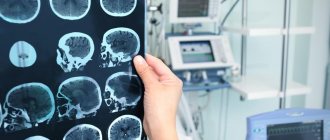Have you ever tried to remember a word so simple and ordinary that it seemed simply impossible to forget it? Have you completely forgotten the name of your favorite actor? Have you ever forgotten your mother’s birthday?
Such sudden gaps occur to everyone from time to time, and there is nothing to worry about. But what if your memory starts to fail more and more often? Often people who are not yet old complain that they forget words, names, dates of famous events and addresses. It is not surprising that at some point this begins to alarm and even frighten.
What are these memory lapses? Signals of vitamin deficiency, signs of chronic disease? Or maybe even signs of future dementia? MIR 24 tried to find answers to these questions.
Alzheimer's disease or just old age? How does dementia develop?
We are accustomed to the fact that with age people inevitably develop some health problems, and they are taken for granted.
That's why it often happens in many families that a grandparent's mental health gradually deteriorates over many years, but no one thinks to see a doctor. When it turns out that the violations have already gone far and time has been lost, the patient’s relatives are sincerely surprised: “We attributed everything to age.” And even many doctors, in response to complaints from a seventy-year-old man about memory loss, answer: “What do you want? It's age."
There is also a stereotype that it is natural to be depressed in old age. It is believed that “old age is not a joy” and an elderly person is characterized by apathy, sadness and “tired of life.”
In fact, constant depression and unwillingness to live are not the norm for any age. These are symptoms of a disorder called depression, and it is treated with special medications - antidepressants.
The table describes conditions that can be considered normal for older people and those that indicate illness.
How to recognize dementia
It is very important to recognize painful manifestations as early as possible, take a closer look at your family, and consult a doctor as soon as possible if problems are discovered. Timely treatment will help extend the years of decent life for our loved ones.
What is dementia
Dementia is the loss of cognitive, or, as experts say, cognitive abilities, that is, memory, attention, speech, spatial orientation and others. With dementia, cognitive abilities are permanently impaired, that is, we are not talking about a temporary deterioration in mental state, as, for example, during an acute illness.
Some decline in memory for recent events is natural in old age, and this phenomenon is called benign forgetfulness. When impairment reaches the level of dementia, people have difficulty performing everyday tasks that were previously easy. If normally a person can make his forgetfulness noticeable only to him, then with dementia the changes are visible first to close people, and then to everyone around him.
Memory loss and loss of everyday skills are not normal at any age. It is always the result of illness or injury.
According to the Aivazovsky method: how to improve memory?
Cicero also said that “memory weakens if it is not exercised.” Therefore, the brain needs training no less than the body. Memory needs to be developed throughout life.
Systematic exercises to train memory and attention can improve cognitive abilities and delay their impairment, says Yulia Levchenko.
Various techniques are used for this:
- memorizing texts, songs, poems;
- solving crosswords, logical puzzles;
- associative memory games;
- Aivazovsky’s method (you need to look at an object for five minutes, and then, closing your eyes, restore it in memory or in a drawing);
- Cicero’s method (what needs to be remembered is located in a well-known place, for example, in a room; when “passing” the room, the necessary information pops up);
- Exercises based on Schulte and Bourdon tables.
“Also, to improve memory and prevent memory impairment, lifestyle modification is important: good nutrition, healthy sleep, quitting smoking, physical activity,” recalls the neurologist.
How to recognize dementia in the early stages: test
With different types of dementia, symptoms may vary and appear in different sequences. Typically, dementia in Alzheimer's disease develops gradually, and often loved ones have difficulty remembering when the patient first began to experience changes. Most often, a doctor is consulted at a time when it is no longer possible to slow down the process and the few medications that can improve the condition no longer work.
A person is likely to develop dementia if:
- he constantly loses important things: keys, documents, etc.;
- puts things in completely unusual places;
- suspects that lost items are stolen, cannot be dissuaded;
- asks the same thing over and over again, forgetting the answer;
- has difficulty navigating on the street;
- makes serious mistakes in things that used to be easy (for example, filling out receipts).
Even one of the listed signs is a reason to consult a neurologist or psychiatrist.
On the Internet you can find many tests that are used to evaluate your own cognitive abilities. One of the simplest and most reliable is the task of drawing a clock. A person is asked to draw from memory a round dial with all the numbers and hands so that they show a certain time, for example, four hours and thirty minutes.
A healthy person can easily cope with this task. With the development of dementia, errors in this test begin to appear very early: for example, “mirror” arrangement of numbers, numbers 13, 14 on the dial, etc. Usually, by this time, problems that may alarm relatives are already noticeable in everyday life. There is no need to wait for them to disappear: the sooner you see a doctor, the more treatment options your loved one will have.
In what cases should you consult a doctor if you are forgetful?
Forgetfulness is not always an indicator of serious disorders in the body. It may be a consequence of simple fatigue or stress. If a person often forgets words in a conversation, the names of his loved ones and events that happened five minutes ago, there is a reason to consult a doctor. Episodic memory gaps are not considered a pathology. Absolutely anyone can encounter them.
You should consult a doctor in the following cases:
- with significant impairment of the functions of writing and speech;
- when false memories appear;
- if changes in memory become noticeable to the environment;
- when mental impairment is accompanied by headache;
- it becomes more difficult for a person to perform his usual tasks;
- the thread of conversation is lost, it becomes difficult to perceive the plot of films.
Several specialists deal with the problem of cognitive impairment. You may need help from a therapist, neurologist or psychiatrist. Doctors prescribe a set of diagnostic measures that will help identify the cause of memory gaps and select a course of treatment.
How does dementia develop?
Most often, it begins with a decrease in memory for recent events: a person begins to forget about important agreements. Errors appear in complex matters: cash payments, equipment management. Suddenly it turns out that a person can no longer learn anything new, for example, when changing a washing machine, he does not remember the new way to turn it on. Over time, only old, well-learned knowledge remains in memory, then they begin to be lost - from newer to older.
The sensitivity of a person with dementia to changes in environment and inability to tolerate changes become noticeable. Sometimes signs of the disease clearly appear after the death of a spouse. Such a sharp deterioration may be associated not only with grief and depression, but also with the need to completely rebuild the way of life and take on tasks that were previously performed by the spouse.
Gradually, the patient loses everyday skills, and orientation in space and time is the first to suffer. At first it becomes difficult to navigate in completely unfamiliar places, then a person can get lost even next to his own home.
It is understandable for a pensioner to be wrong by one day in the number or day of the week, but with dementia a person even names the month and year incorrectly. It becomes difficult to determine the time using a watch; many people “confuse day with night”: waking up after a nap, they decide that it is already morning.
Gradually, difficulties appear with planning the simplest actions: the patient cannot prepare food, dress, tie shoelaces, wash, or brush his teeth. In the later stages, even such seemingly obvious skills as recognizing objects and walking are “forgotten.”
Speech is gradually lost: at first, one’s own speech becomes poor, a person forgets words, replacing them with meaningless phrases, for example, “this is the same.” Over time, the understanding of speech heard and read is also impaired, and this process is not associated with hearing impairment. If the patient does not comply with your requests, think about whether he understands what you said. Perhaps he does not recognize the meaning of individual words, or your speech is no longer a meaningful set of sounds for him.
As the disease affects the parts of the brain responsible for movement, the person becomes more and more awkward, walks with a shuffling gait, and facial expressions become poor. At the last stage of the disease, the patient forgets how to walk.
Consequences and prognosis
With mild to moderate severity of cognitive impairment, the prognosis is relatively favorable. Adequate therapy in some cases slows the progression of brain dysfunction and prevents further memory deterioration. The consequences of severe forms include social maladaptation and inability to self-care.
In the later stages of the course, the patient needs outside care around the clock. With vascular dementia, the probability of death within 5 years is more than 60% of cases. A high mortality rate correlates with concomitant pathologies - arterial hypertension, atherosclerosis, heart failure.
There are many diseases that provoke impaired cognitive abilities, when you constantly forget everything. A neurologist can make an accurate diagnosis and prescribe the correct treatment.
319
Alzheimer's disease
Aging is a natural process. And it is natural that with age a person may forget something. However, if an elderly person constantly forgets recent events, but at the same time remembers his youth well, if he is usually active and assertive, he suddenly becomes quiet, and vice versa, a previously reserved person suddenly commits many rash acts, if an extrovert suddenly begins to avoid communication even with members of his family If he loses interest in a previously very favorite hobby, one should suspect the onset of Alzheimer's disease. It is an incurable degenerative disease in which some neurons in the brain die. It is often called senile dementia of the Alzheimer's type.
Alzheimer's disease affects each person differently, but it also has common symptoms.
There are four stages of the disease: predementia, early dementia, moderate dementia, severe dementia.
Pre-dementia is the first, earliest symptoms of the disease, which are often not noticed, attributing them to age or stress. However, if you carefully observe a person, the disease can be recognized five years before its onset. Symptoms of pre-dementia:
- inability to recall recently learned information;
- inability to learn new information;
- inability to concentrate;
- inability to remember the meaning of any known word;
- disturbance of abstract thinking;
- apathy.
Of course, these manifestations do not always indicate imminent Alzheimer's disease, but it is better to contact a good specialist for examination.
First symptoms of Alzheimer's
Short-term memory is the first to suffer. The condition when a person forgets recent information, but remembers events that happened many years ago, is typical for older people. Therefore, the symptoms of Alzheimer's disease are not noticeable for some time.
Over time, forgetfulness increases. A person forgets where rooms and things are located, surprises relatives and friends by not recognizing them.
Apathy is another symptom. Interest in usual activities disappears, patients become indifferent to their appearance and condition.
Very often, patients do not understand that their behavior is caused by the development of the disease, attributing everything to fatigue and everyday stress. Because of this, diagnosing Alzheimer's early in the disease is often impossible.
Development of Alzheimer's disease
The progressive disease leads to degradation of brain functions. The person becomes completely helpless, cannot walk, sit, or eat food on his own.
Alzheimer's disease is a consequence of physiological processes occurring in the body. Its symptoms manifest themselves in varying degrees of dementia.
Predementia
This condition is usually diagnosed after Alzheimer's has progressed to the later stages. Doctors reconstruct the medical history based on the memories of relatives and the patients themselves about events that occurred (on average) 8 years ago.
Among the initial symptoms of Alzheimer's disease there is nothing special:
- impairment of short-term memory; - progressive forgetfulness; - growing need for records of everyday affairs; - decreased interest in usual activities; - increasing apathy; - desire for solitude and isolation.
Early dementia
At this stage, the increasing destruction of cells and neural connections in the brain intensifies the initial signs of the disease, forcing patients to seek medical help. New Alzheimer's symptoms appear:
What is the name of the disease in which you forget everything?
The huge amount of information that has to be processed and memorized every day requires a well-developed memory. If a disease occurs when a person forgets everything, then he has a lot of problems. Because of it, not only work suffers, but also everyday life within the home. Constantly forgetting important information can also affect your relationships with people. Therefore, such diseases should be given special attention.
A disease that causes a person to have problems remembering information is usually understood as multiple sclerosis. It is often attributed specifically to older people, but it can occur even in minors. The name of the disease is due to the fact that a person has several scattered lesions where there is damage that provokes such forgetfulness.
With sclerosis, inflammation develops in the central nervous system, after which the body begins to fight itself, destroying the myelin that forms the cells of the brain and spinal cord. As a result, memory gradually deteriorates, and nerve fibers begin to die. Most often, the disease does not appear for a long time, and then its signs begin to suddenly emerge. There are also frequent periods of remission, when the patient’s condition improves for some time.
Doctors distinguish several types of sclerosis:
- clinically isolated syndrome – primary manifestations of the disease;
- remitting – there is an alternation of remissions and relapses;
- secondary progressive – memory impairment is constantly increasing, remissions are weak;
- remitting-progressive – remissions alternate with significant relapses;
- primary progressive – the disease develops continuously without remissions.
A disease in which you forget everything can be benign or malignant. In the first case, no noticeable development of sclerosis is observed for 15 years. In the second, it progresses and leads to a serious condition within 3 years.
Other illnesses can also lead to memory problems. The most common ones are: Alzheimer's, Parkinson's, amnesia or dementia.
Causes, signs
Old age cannot be called the cause of the development of sclerosis, even in older people. It develops due to genetic disorders, unfavorable environment, bad habits, poor diet or increased mental stress. In rare cases, the condition can be triggered by infectious diseases or a lack of vitamin D in the child. Women are more likely to experience the disease.
Symptoms may vary. It all depends on where exactly the disturbances occurred in the brain. If a person regularly forgets the next day what happened yesterday, then this can already be considered a sign of sclerosis. Along with this, other symptoms may appear.
Secondary signs of sclerosis:
- muscle weakness;
- increased fatigue;
- decreased visual acuity;
- numbness of the limbs;
- dizziness;
- problems with coordination;
- urinary disturbance;
- impotence;
- epileptic seizures.
As the disease progresses, all symptoms become more pronounced. Often these are accompanied by problems with speech, decreased physical strength, decreased sensitivity of the skin, deterioration of intelligence, and urinary and fecal incontinence. The patient may sit with a face that does not express any emotions and show no interest in others, even if someone calls him.
In most cases, sclerosis is limited to simple memory impairment, combined with fatigue and periodic dizziness. Some people don’t even attach any importance to this, not thinking about visiting a doctor.
Prevention measures
To avoid cognitive decline, it is necessary to take preventive measures in time. At risk are people engaged in heavy physical or mental labor, pensioners and children. Sometimes problems with brain neurons occur due to bad habits.
To avoid memory problems, it is advisable to adhere to the following recommendations:
- Undergo a comprehensive examination of the body in a timely manner. Early diagnosis of dangerous diseases will help avoid serious memory problems.
- It is important to monitor the completeness of your diet. It should contain a sufficient amount of proteins, vitamins and minerals. Products containing omega-3 and B vitamins are especially beneficial.
- For proper functioning of neurons, you should stop smoking and drinking alcohol.
- In order for the brain to work at full capacity, you need to take care of normalizing your sleep and rest patterns. An adult should sleep at least 7-8 hours a day. During sleep, the brain continues to process information received the day before. With frequent awakenings and interrupted sleep, this process is disrupted.
- Any activity aimed at developing fine motor skills has a positive effect on brain function. These include handicrafts or folding puzzles.
- Physical activity stimulates blood flow to brain cells. This has a positive effect on his work. Both strength training and dancing or jogging can be beneficial.
- Breathing exercises help saturate brain neurons with oxygen. In addition, it has a beneficial effect on a person’s emotional background.
- Any changes can significantly improve a person's cognitive function. Sometimes it is enough to rearrange your home or change your route to work. This approach will provide flexibility of thinking.
- It is advisable to reduce the consumption of sweets to a minimum. Its excessive consumption leads to a decrease in the volume of those parts of the brain that are responsible for memory. The human body needs enough glucose from fruits and vegetables.
If a person begins to forget words during a conversation, it is necessary to understand the reasons for this phenomenon. Sometimes we are talking about ordinary fatigue or stress. If you have suspicious symptoms, you won’t be able to figure it out without a doctor.
Healthy? Share the article on VKontakte or Facebook in 1 click!
memorybrainwork
Prognosis, therapy
Such an unpleasant illness, when you don’t remember anything from yesterday, creates a lot of problems. However, the prognosis for most patients is disappointing. If sclerosis progresses quickly or is not treated, then after a few years there is a high risk of becoming disabled, since the ability to move independently will be absent, and some organs will cease to function normally.
Dementia may develop, leading to dementia. With timely detection of the disease, which is immediately supplemented with high-quality therapy, there is every chance of transferring it to a mild stage with long-term remissions. But even then there will be a risk that the disease will begin to progress rapidly after many years.
The whole point of treating sclerosis is to reduce the severity of symptoms and extend periods of remission. This allows you to eliminate the onset of disability, maintain your ability to work, and also avoid serious brain damage. For this purpose, methylprednisolone, a corticosteroid, is used.
To minimize the risk of side effects, a special diet is additionally prescribed, requiring the consumption of large amounts of food that is rich in potassium. Such therapy is prohibited for hypertension, diabetes, tuberculosis, infections and ulcers. The patient may also be prescribed immunomodulators or a blood purification procedure.
Equally important is taking medications aimed at eliminating the main symptoms of the disease and providing psychological assistance. For the latter, doctors strongly recommend contacting a professional psychologist. In some cases, additional physical rehabilitation is required. It is necessary to restore the functionality of the limbs, improve fine motor skills and normalize coordination.
Everyone knows what they jokingly call a person who forgets everything. In fact, he may have serious health problems that require mandatory medical intervention. Therefore, you should be attentive to your loved ones.
You should not expect a full recovery if sclerosis develops. However, everyone has a chance to suppress the disease, transferring it to a weakened state characterized by long-term remissions. You just need to do your own treatment and follow all the recommendations of your doctor.
What to do if memory deteriorates and words are forgotten
When memory declines, the logical question arises about what to do if you start to forget words. A set of measures should be aimed at eliminating the cause. For example, for vascular disorders you need to take certain medications, but for Alzheimer's disease you need to take completely different ones.
Treatment options may include:
- For mental disorders, antidepressants and sedatives are prescribed.
- If we are talking about the development of dementia, it is necessary to use nootropics and cholinergic drugs.
- For the purpose of general strengthening of the body, vitamin complexes may be prescribed.
To improve semantic memory, it is necessary to carry out regular training. The more often they occur, the more reliable the connection between brain neurons becomes. To improve brain function, it is useful to solve crosswords and puzzles. You can use special applications or online programs. They are aimed at improving concentration, memory development and flexibility of thinking.
New methods of memorizing words will be a good assistant in case of memory loss. They are based on creating an associative connection. To remember a specific date or word, you need to assign a visual or audio image to it. You can also come up with rhymes for the required word.
Intellectual games are considered a good way to improve brain function. This could be chess, monopoly or card games. As an alternative, you can consider mobile apps.
Meditation also has a beneficial effect on mental functions. It normalizes the emotional background and activates the areas responsible for short-term memory. To maintain brain function at the required level, it is enough to devote 5-15 minutes a day to meditation.











